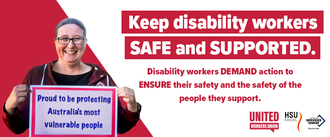- Featured
- Asylum Seekers and Migrants
- Climate and Environmental Justice
- Disability Justice
- Economic Justice
- Education
- First Nations Justice
- Health and Medicare
- International Solidarity
- LGBTIQA+ Rights
- Media and Arts
- Occupational Health and Safety
- Public Services
- Public Transport
- Racial Justice
- Social Justice
- Women's Rights
- Workers' Rights
- More
-
Keep our disability workers SAFE and SUPPORTED.During this crisis, there is no more important time to show our support for Australia's most vulnerable citizens. They deserve to be safe and supported, and the workforce they rely on need to be safe and supported as well. These measures need to apply to all people with disability and the workers who support them – not just those funded through the NDIS. If we are going to beat this crisis, we need action now. Demand action. Sign the petition NOW.1,481 of 2,000 SignaturesCreated by United Workers Union

-
Support the disability sector during the COVID-19 pandemicAs the principal funder of disability services, the Federal Government has the responsibility to ensure services continue in a safe way for both people with a disability and the workers who support them. The Federal Government must take action now to ensure that people with disability are able to safely access services. The disability workforce across Australia are amongst those on the front line of this crisis, continuing to provide support and assistance to people with disability. Disability support workers already feel overworked and understaffed. There are also high levels of insecure, casual work in the disability sector. They must be better supported in doing their job and facing this COVID crisis – to ensure their safety and the safety of the people they support.1,479 of 2,000 SignaturesCreated by Health Services Union

-
#RaiseTheDSP NOW – equality for disabled people and carersThe government cannot be allowed to ignore disabled people in the midst of a global pandemic. When the stimulus announcement was made we were shocked to learn we had been excluded. It exposes that the government just doesn’t get it – what it means for people who are disabled, and why the DSP is different to other payments. It costs more to be disabled. We are workers too, and disabled people and carers are losing income as a result of this crisis. Many disabled people are more vulnerable to COVID19 than other Australians. We face higher costs for specialised supports, healthcare, medication, housing and transport. There are many essential costs that the NDIS does not cover and during the pandemic people’s costs are only going up. The cost of support workers and other specialised services is increasing, some by as much as 10 per cent. NDIS invoice processing times are blowing out. This decision to exclude disabled people and carers exposes the government’s failure to understand our lives and needs. We must not let the government divide us into ‘deserving’ and ‘undeserving’ groups. We must demand that our leaders immediately include the most vulnerable people in our community in the $550 per fortnight coronavirus supplement. We must stand together in the fight for disabled people and carers to be treated equally.7,079 of 8,000 SignaturesCreated by Australian Unemployed Workers Union

-
Home care & disability workers need paid leave & protective gear to stop the spread of COVID-19!The lives of thousands of Australians hinge on our government taking immediate action by guaranteeing paid leave and protective equipment for all home care & disability support workers.477 of 500 SignaturesCreated by United Workers Union
-
Stop leaving NDIS clients out in the cold! Disabled clients and their care workers deserve dignityMy name is Jane, and my client Kim is one of thousands of NDIS clients who received the letter telling them their services with Australian Unity will be cut. I’ve been working with Kim for fifteen years, and I’ve never seen her this stressed. She chose to challenge Australian Unity’s decision on the basis that the changes would put her health and safety at risk, but now she’s on the verge of having her care discontinued, with no adequate replacement services in place. All Kim wants is to maintain quality care from her care workers she has had long lasting relationships with. She’s tried everything she can think of, and now she’s scared. As a former health professional, she knows her condition would be far worse, if it wasn’t for the well trained care workers she receives her daily care from.1,306 of 2,000 SignaturesCreated by Jane, care worker
-
Support Victorians with disabilities and the people who care for themIf employers continue to be bound by the current arrangements, they will soon be unable to continue delivering key services. We’ll see large-scale job-losses, loss of expertise, disruption of services to clients and a high potential for reduction in the quality of services. Without this support, Victoria’s disability sector will likely fail to retain the skilled and committed workers required under the NDIS, potentially resulting in widespread market failure across Victoria. We need to see an investment of $46 million over 3 years, to deliver the quality NDIS that people with disabilities so rightly demanded. This represents just 7 cents in every dollar that the Victorian government will contribute to the NDIS in a single year – but the impact will be huge.184 of 200 SignaturesCreated by Clare Neal
-
Join The Fight - Demand Disability Rights1. Fully-Funded National Disability Insurance Scheme (NDIS). The NDIS since its rollout has faced many issues such as over-the-phone planning through NDIS staff with limited training and expertise in the area leading to poor quality plans; no or reduced funding support under the NDIS for transport support, housing and employment assistance, advocacy services, guide dog assistance, and speech therapy among other things; the price setting of disability services at prices that are too low to cover the cost of the services - meaning disability service providers are either having to cover the cost, cancel the service, or make their clients pay up front - as well as struggle under limited resources for staff training and expansion (leading to concerns about privatisation); and there not being enough NDIS staff per NDIS participant which is leading to delays in approved plans. The Government needs to fix NDIS now and give people and students with disabilities the care they need. 2. Fully-Resourced Campus Counselling and Disability Services The NUS Wellbeing Report found that two thirds of young people rated their mental health as only fair or poor, while 35% reported that suicidality impacted on their ability to study. Despite this, campus counselling services are frequently under-funded and under-resourced, with long wait times, poor experiences with campus counselling services and the general stigma of seeking help impacting services. Some universities still do not have access plans for physical or mental health, or they are under-marketed or promoted on campus. Universities need to treat counselling and disability services as important aspects of their duty of care to students and fund them adequately. 3. Accessible campus facilities and academic curriculum Campuses need to become more accessible for students - this includes but is not limited to wheelchair accessibility, as well as sensory sensitive classrooms and spaces, and events. Further, some universities still do not offer special consideration for mental illness, adequate exemptions for missing study, accessible material for those who have to miss physical classes, or academic material that is sensory-sensitive, made for people who are deaf or hard of hearing, or who are blind or visually impaired. Universities need to be fully-funded so they can be accessible for everyone. 4. Funding Mental Healthcare and removing the Medicare cap Mental Healthcare is chronically underfunded in Australia, and the Federal Government only offers 10 sessions per year under its Medicare Mental Healthcare plan. This is not sufficient for people and locks them out of the mental healthcare system if they need more than 10 sessions per year. Nobody should have to choose between their financial wellbeing or their mental health. The Government needs to take mental healthcare more seriously, by adequately funding it and removing the 10 session per-year cap through expanding Medicare assistance.40 of 100 SignaturesCreated by NUS Disabilities

-
Protect Our Aged and Disability ServicesWe can’t forget about our older community members. They deserve to be cared for and looked after. Some are not fortunate to have family or friends to advocate on their behalf. The aim of home and community care services like Meals on Wheels, assistance with showering, shopping and cleaning is to keep the older members of our community in their own home and out of aged care facilities. Many other councils throughout Victoria have privatise and outsource these services. And those who deliver these services are some of the lowest paid workers predominately female workers. We as a community cannot afford for these services to be privatised.396 of 400 SignaturesCreated by Penny Flynn







